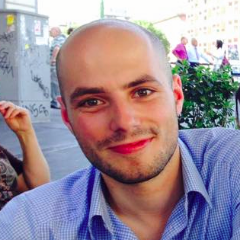The grand gate of Thebes stretches into the hazy distance. Palm trees waft beneath the gaze of towering pharaonic busts. A sea of soldiers and dignitaries in sundry regalia gathers in the shadow of two sphinxes. Franco Zeffirelli's 1963 La Scala production of Aida is the product of another age: namely, one in which the size of the spectacle, rather than the freshness of directorial insights, was the criteria by which performances were judged. If that makes Zeffirelli's oeuvre unfashionable today, there is no denying that this Aida is visually impressive.
But why, at a time when The Met is on a mission to remove the director's beloved productions from its seasons to make room for something fresh, has La Scala decided to bring one back? That is explained by the Florentine director's recent 95th birthday, which the Milanese house has chosen to commemorate by reviving a Zeffirellian concoction of legendary status. In one of the production's most famous passages, the second scene of Act 2, the director takes recourse to sheer numbers, by filling the stage with young dancers for the Moorish slaves and waves of supernumeraries for the high-octane conclusion. You feel you ought not to approve of such directorial extravagance, but catch yourself being drawn into the grand pageant. Zeffirelli's Aida is a guilty pleasure.
But it might have all looked ridiculous were it not for strong musical performances in support. Thankfully, we got them. Daniel Oren, the 63-year-old conductor who made his La Scala debut when this run opened, has conducted few operas as frequently as Aida. Here, he drew playing that was clean, razor sharp and imposing when required. The Triumphal March was monumental, but also refined, with onstage trumpets balanced wonderfully against the roaring forces in the pit. More tender moments, too, were managed with nuance, not least with heart-warming playing for the moment Aida and Amonasro are reunited. Oren never lets us forget that Aida is very much a grand opera, but he also reminds us that it is laced through with intimacy.
More than anything, Zeffirelli's production is a showcase for the singers. And here there were some fine voices to spotlight. Krassimira Stoyanova dominated the stage as Aida, matching urgency with voluptuousness in "I sacre nomi di padre", stonking vocal heft in "Ritorna vincitor!" and a golden stream of mellifluous sound in an "O patria mia" that made you want to sob. Hands-on direction is hardly Zeffirelli's style (nor, evidently, is it that of his assistant Marco Gandini, who was looking after this revival) and while Stoyanova has the requisite charisma to generate a compelling performance on her own, the inscrutable Fabio Sartori as Radamès could have done with more help.
That said, if there is a production in which stand-and-deliver performances are permissible, this is it. And Sartori's delivery was top rate. The tenor's voice is muscular but never pushed, open and unwaveringly well-supported. "Celeste Aida" gushed in a powerful flow of burnished tone. Similarly brawny was Violeta Urmana's Amneris (while the mezzo took a while to get into her stride in this antipenultimate performance of the run, she cut a formidable force once warmed up, dauntlessly storming through her arias). George Gagnidze exuded authority as the dignified Amonasro. Zeffirelli's production, too, remains a thing of untainted majesty.




